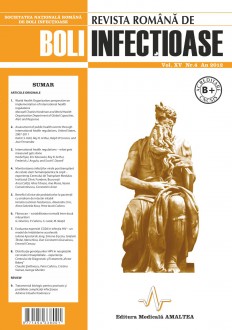SELECT ISSUE

Indexed

| |

|
|
|
| |
|
|
|

|
|
|
|
|
|
| |
|
|
HIGHLIGHTS
National Awards “Science and Research”
NEW! RJID has announced the annually National Award for "Science and Research" for the best scientific articles published throughout the year in the official journal.
Read the Recommendations for the Conduct, Reporting, Editing, and Publication of Scholarly work in Medical Journals.
The published medical research literature is a global public good. Medical journal editors have a social responsibility to promote global health by publishing, whenever possible, research that furthers health worldwide.
INTERNATIONAL HEALTH REGULATIONS – WHAT GETS MEASURED GETS DONE
Kashef Ijaz, Eric Kasowski, Ray R. Arthur, Frederick J. Angulo and Scott F. Dowell
ABSTRACT
The global spread of severe acute respiratory syndrome highlighted the need to detect and control disease outbreaks at their source, as envisioned by the 2005 revised International Health Regulations (IHR). June 2012 marked the initial deadline by which all 194 World Health Organization (WHO) member states agreed to have IHR core capacities fully implemented for limiting the spread of public health emergencies of international concern. Many countries fell short of these implementation goals and requested a 2-year extension. The degree to which achieving IHR compliance will result in global health security is not clear, but what is clear is that progress against the threat of epidemic disease requires a focused approach that can be monitored and measured efficiently. We developed concrete goals and metrics for 4 of the 8 core capacities with other US government partners in consultation with WHO and national collaborators worldwide. The intent is to offer an example of an approach to implementing and monitoring IHR for consideration or adaptation by countries that complements other frameworks and goals of IHR. Without concrete metrics, IHR may waste its considerable promise as an instrument for global health security against public health emergencies.
